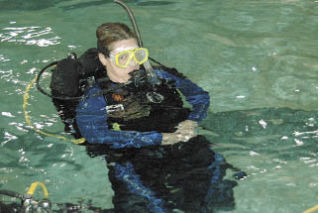MARYSVILLE — I have a confession to make.
I can’t swim.
Watching the high school swim team perform at any meet seems like witnessing a small miracle.
My idea of swimming is putting on a lifejacket and paddling around Twin Lakes at a leisurely pace. But without a life preserver, I don’t go out of the shallow end. Without one, I sink — to borrow the age-old simile — like a stone.
So despite watching a season of boys and girls swimming last year, I had no idea of ever getting into the Marysville-Pilchuck pool, let alone with the intent to descend.
But when Smokey Point Diving gave me the chance to load on the scuba gear and get acquainted with the pool’s depths, I accepted their offer with minimal trepidation. As a sinker, I should be a natural.
In one session with divemaster Aaron King, we covered the most rudimentary basics of scuba: breathing through the mouth, finding the regulator mouthpiece underwater, hand-signal communications and coping with water in the facemask. (That last task inspired a little fear, taking a few attempts to master.)
After getting a handle on these essentials, I got to paddle around the deep end of the pool. Only around 15 feet at its deepest point, there was still a noticeable change in pressure at that depth. That’s small potatoes compared with the depths of up to 60 feet divers can see in the four practice dives they’ll take in the process of becoming certified through Smokey Point Diving.
“It’s a simplified version of what you do in the class,” said co-owner Tim King, Aaron’s father, in reference to the three-week class they offer to certify you. “You’re on scuba the first day of class.”
All in all though, I got the impression that I had gotten a taste of what the class is about.
“It’s not that hard, is it?” said Steve King, who co-owns the store with his father, coming over to me after my second lap around the bottom of the pool, which was much easier than the first. “Once you’re certified in Washington state, you can dive anywhere,” he added.
Because of the region’s lower visibility and colder temperatures, Washington tends to produce divers more experienced with scuba equipment. While divers in the Caribbean, for example, would typically learn in their bathing suits, divers here will go out in wetsuits. And the Kings don’t let temperatures get in the way of offering classes year-round.
Divers who go through the certification process learn more skills and the physics and physiology of diving, Steven said.



